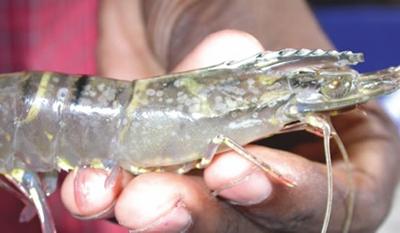Can the environment help control disease in Asian aquaculture?

The University of Southampton is leading an international project to understand how the environment can help to control the risk of disease in fish and crustacean aquaculture in India and Bangladesh.
Infectious disease outbreaks represent a key limitation to the sustainable expansion of the aquaculture industry to meet the global challenges of food security and poverty alleviation.
The consortium, which is jointly led by the University of Southampton (UK) and the Central Institute of Brackishwater Aquaculture (India), involves nine research institutes and universities in India, the UK and Bangladesh.
The aim of the project is to calculate the role of physical pond conditions in controlling two socio-economically devastating pathogens of decapod crustaceans and freshwater fish in Asian aquaculture.
Global losses to White Spot Syndrome Virus (WSSV), the causative agent of white spot disease (WSD) in shrimp and other crustaceans, have been estimated to cost between US$ 8-15 billion.
Dr Chris Hauton, Associate Professor in Ocean and Earth Science at the University of Southampton and Principal Investigator of the project, said: “Currently, there is no effective means of controlling this globally significant pathogen that has been proven at farm scale. Our current best option is to understand how the environment controls disease progression in shrimp ponds, as a means to reduce the risk of infectious outbreak. This knowledge, incorporated into guidelines for best management practice, will allow for the development of novel intervention strategies to be implemented in the future.”
At least 94 species of fish are affected by ulcerative syndromes (EUS) caused by the pathogenic fungal-like oomycete Aphanomyces invadans. In the period 1988–89 Bangladesh alone suffered a revenue loss of US$ 4.8 million due to EUS. Professor Pieter van West, Director of the International Centre for Aquaculture Research and Development at the University of Aberdeen, added: “This is a very important award that will give us much needed information about EUS. As far as we know, this disease has not reached European aquaculture, but is one disease we should be very vigilant about as it is uncontrollable at the moment.”
Researchers will work with farmers in India and Bangladesh to identify existing best practice to formulate new guidelines to disseminate throughout farming communities across Asia. The team will also develop new understanding of the host pathogen interaction for both diseases, with the intention of developing future novel intervention methods with which to tackle infection.
Funding for this research has been provided through the Global Research Partnership Aquaculture, representing the Department of Biotechnology (DBT) India, the UK Biotechnology and Biological Sciences and the Economic and Social Research Councils (BBSRC and ESRC), the Newton-Bhabha Fund and UK Aid.